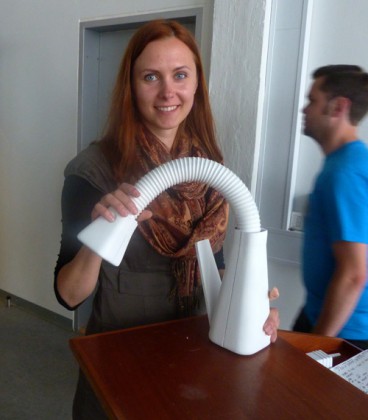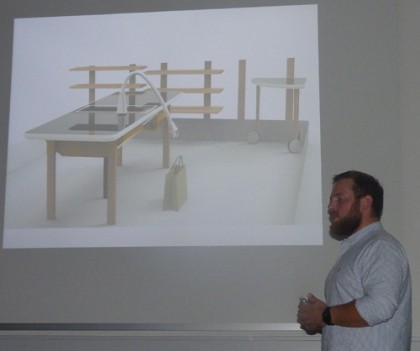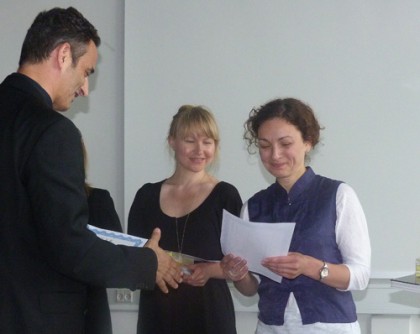Helping hand and adjustable kitchens developed during innovation camp
July 9, 2013

The “helping hand” prototype to raise the grocery bag, open cans and tidy up cooking spot was among others developed by Jekaterina Stakle, Art Academy of Latvia, Faculty of Design.
How does the perfect kitchen look like that improves the quality of life for seniors who want to stay active and mobile at home? Concepts and prototypes to answer this question were developed at a five-day innovation camp at the School of Design in Copenhagen in July. Students and companies from seven different countries met up to develop a set of concepts and prototypes of sustainable and multifunctional kitchens to +65 segment.
Mathieu Riviere, senior industrial designer at Electrolux, found it astonishing to see how well the students worked interdisciplinary in the transnational teams. “I am honestly positively surprised about the well-functioning team work between the students of the different countries and disciplines, such as design methodology, Concepts generation or Industrial Feasibility Discussions.”, he said. The way traditional kitchen concepts and product ideas were re-thought was very dynamic and inspiring for him to see. Other companies attending were for example Nobia (Marbodal) and NOA’s joinery.
The Innovation Camp assembled 70 participants and is the largest event executed in the project Comfort in Living, which is one of the StardDust sub-projects. StarDust brings together academia, business and the public to find common and better solutions for the Baltic Sea region. The overall goal is to find new answers to the social challenges of people around the Baltic Sea meet.
Comfort in Living is led by Lotten Svensson at IDC West Sweden AB in Skövde and the objectives of the project is to develop concepts for products and services that improve quality of life for seniors who want to stay active and mobile at home. The vision is to offer the most effective and valuable solution regarding multi-functional kitchen for elderly throughout the world. A common home market in the Baltic Sea region is seen as an important first step.
“It’s the first time that an Innovation Camp brings together designers, educators and businesses around the Baltic Sea and I am very pleased that leading companies, talented teachers and students joined us to develop creative ideas to develop the Baltic Sea region to become even more competitive”, says Lotten Svensson.
“We experienced of course cultural differences”, states the Swedish student Olle Torkelsson. “But however these I experience as well if I work with my fellow student from another discipline at my home university in Sköve in Sweden”, explains Olle, who is studying design engineering.

Martin Bo Christiansen from Designskolen Kolding, Denmark, presents the awarded mobile and adjustable kitchen island with the “helping hand”.
Sketches and models were developed by international cross disciplinary teams, which by the end of the week competed to win the award for the best concept for multi-functional kitchen and the award for the best kitchen equipment for the target group 65 +. Besides the aspect of design and functionality, the teams also had to investigate into a business plan for its final concept.
After four days of intensive work on design and business models, the results were presented to a jury of leading clusters and companies within the design sector. The head of the jury Betina Simonsen from the Development Centre UMT crowned the winning team.
The awarding ceremony was attended by Thomas Alslev Christensen from the Danish Ministry of Science, Innovation and Higher Education (DUSTI), who was pleased to see the cross national and cultural approach as well as the concrete results of the camp. His ministry`s ambition is it to set good framework conditions for collaborations and develops clusters, which are essential tools to establish competitive and strong regions, said Thomas Alslev Christensen. “The innovation camp uses exactly this framework and is a fantastic initiative for organizations from different countries to meet and to start partnerships.”

Thomas Alslev Christensen, DUSTI, congratulates the awarded Anna Johansson, Chalmers University of Technology, Sweden and Larissa Frosch, Tallinn University of Technology,Estonia.
The sketches and models will be exhibited on 6 November in Malmö at the final conference of the StarDust project, which is a transnational project co-financed by the European Union’s Baltic Sea Region Programme 2007-2013.
Participating partners in the project are IDC West Sweden, The Art Academy of Latvia, Business Cooperation Center of Southern Lithuania, The faculty of Wood Technology, Poznan University of Life Sciences (Poland). Associated partners are The Development Centre UMT in Denmark, Culminatum Innovation in Finland and the Estonian Academy of Arts.
For more information contact Lotten Svensson, 0046705-33 1009, lotten.svensson (a)idcab.se
